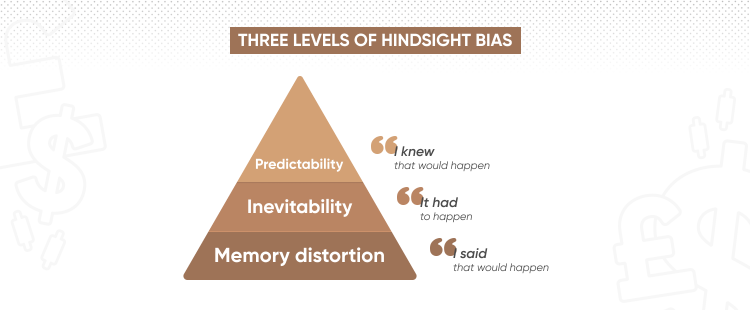Effects of hindsight bias
Overconfidence: Hindsight bias could lead people to believe that they knew the outcome of an event all along. This in turn could lead to overconfidence in their own decision-making abilities.
Blaming the victim: In cases where a negative outcome has occurred, hindsight bias could cause people to blame the victim or believe that they should have known better, rather than recognising that the outcome was not foreseeable.
Misjudging the value of information: When evaluating decisions in hindsight, people may assume that information that turned out to be important was always important, even if it was not recognised as such at the time.
Underestimating the role of chance: Hindsight bias could lead people to underestimate the role of chance in determining the outcome of events, and to assume that the outcome was the inevitable result of the decisions made.
Hindering learning: Hindsight bias could make it difficult for people to learn from their mistakes, as they believe they would have made the same decision regardless of the outcome.
Inflating personal responsibility: Individuals could end up believing they were solely responsible for a positive outcome, overlooking the contributions of others or external factors.
Reinforcing stereotypes: Hindsight bias could reinforce stereotypes, as people may assume that the outcome of an event was predictable based on their pre-existing beliefs or biases.
Example of hindsight bias
Let’s use a hypothetical example to illustrate how hindsight bias could impact trading.
Imagine a trader who is fairly inexperienced. With their first few trades, they end up making money. It might be that they had some good information, or some good luck, or they were genuinely shrewd. However, the trader does understand why the market moved in the way that it did.
Whatever the real reason for their early success is, they think that their good fortune was inevitable, which leads to them taking unnecessary risks which, in turn, means that they could start to lose money.
The problem is that trading involves making a lot of predictions, about the direction of a market, which assets to invest in, which derivatives to trade, etc. A trader will almost certainly make hundreds of decisions in a short space of time. If just a handful of them end up being accurate it is possible that the hindsight effect will lead to our hypothetical trader to think they have a kind of midas touch when, in truth, they might have a fairly low hit rate.
Hindsight bias awareness
So, we know what hindsight bias is, but there are ways that traders can become aware of it.
If you start thinking some market movements were inevitable, whether you profited from them or not, you might be falling victim to hindsight bias.
Traders could avoid falling into the hindsight bias trap by considering the following:
Dummy forecasts. It could be useful to make a price forecast and keep track of how many of the forecasts were accurate. This could help ward off hindsight bias.
Diary making. Keeping a diary or journal of trading and investing activities could allow traders to reflect on their decisions and how they arrived at them.
Consider alternatives. If a trader feels an occurrence was inevitable, they could take a step back and work out what else might have happened. If they are thorough, they might be able to see that something they thought was inevitable was in reality anything but.
Be prepared. Markets can be highly volatile. This means that things can go in a genuinely unexpected direction at any time. Therefore, preparation and caution are key, rather than assuming that, because something has happened before, it will happen again.
Be thorough. Traders who work thoroughly, analyse the markets and make careful decisions are less likely to fall victim to hindsight bias than those who just rely on their memory or instincts.
Conclusion
Knowing about, and understanding, hindsight bias, can potentially help traders make more informed decisions. Ideally, we would be able to think things through and act with due care and caution, analysing our decisions and their results so we learn for the next time, rather than thinking something was inevitable, which could potentially lead to overconfidence and a lack of proper analysis.
Hindsight bias is the tendency to incorrectly think that we knew something was going to happen when. This can be an issue when it comes to trading, because it can lead to overconfidence, which can lead to not analysing markets and trades properly, which can lead to losing money.
Even if we could eliminate hindsight bias altogether, trading would still carry a high amount of risk. Markets can move in the direction that we do not want them to move in at any time, so it is important to do your own research and never trade with more money than you can afford to lose.








